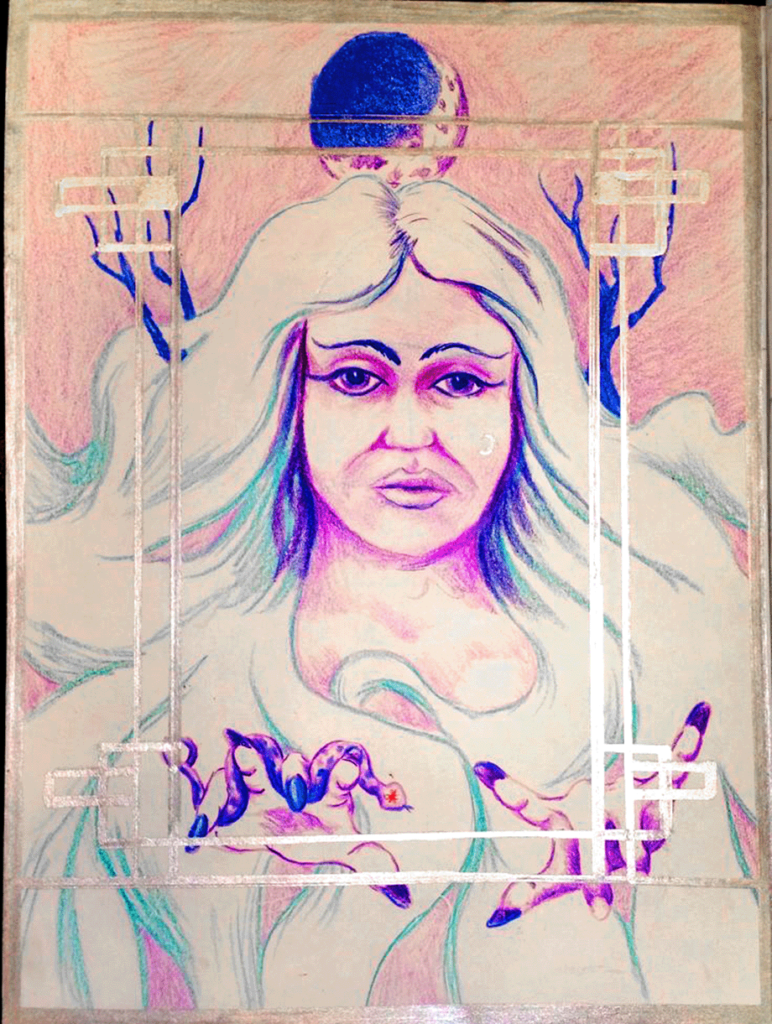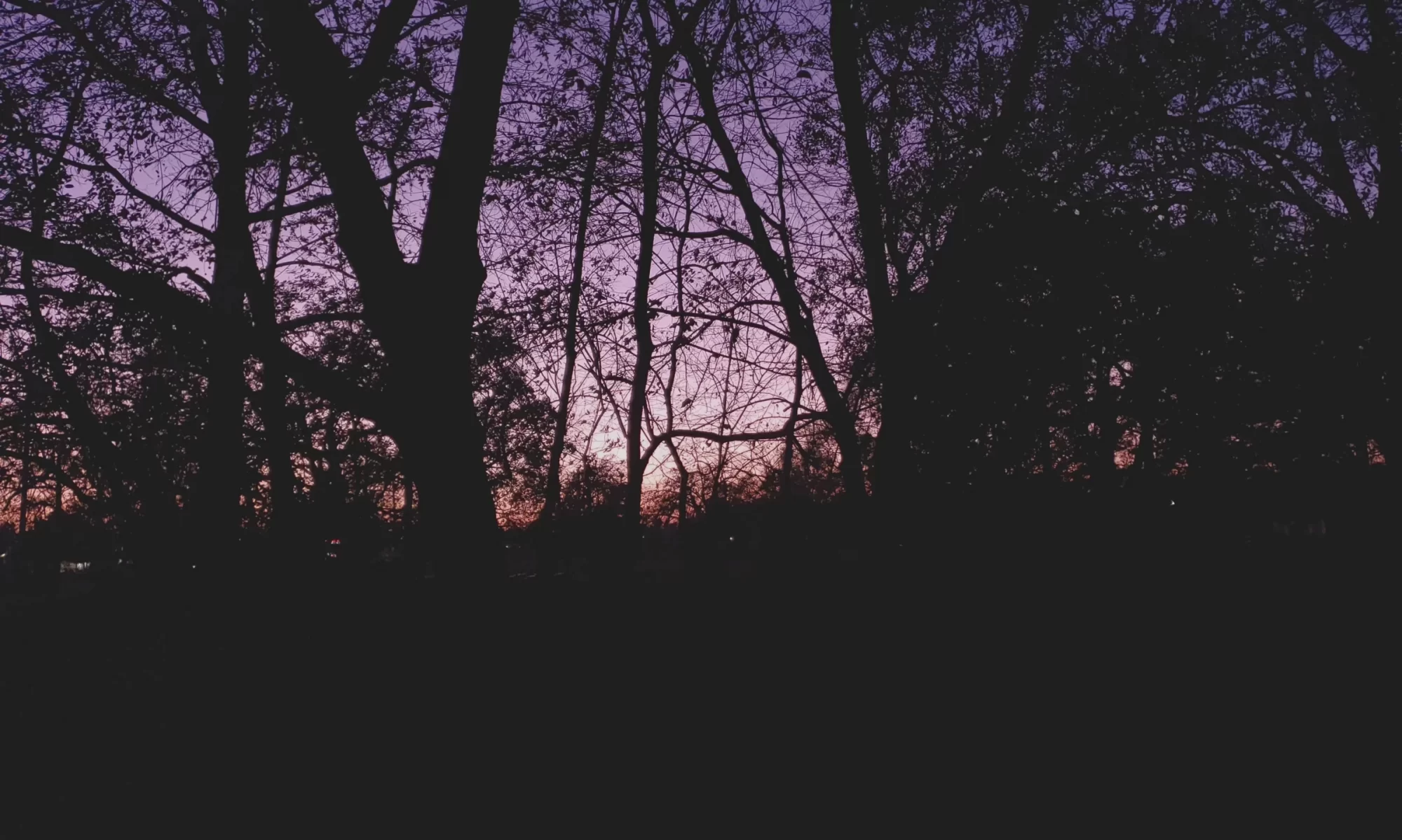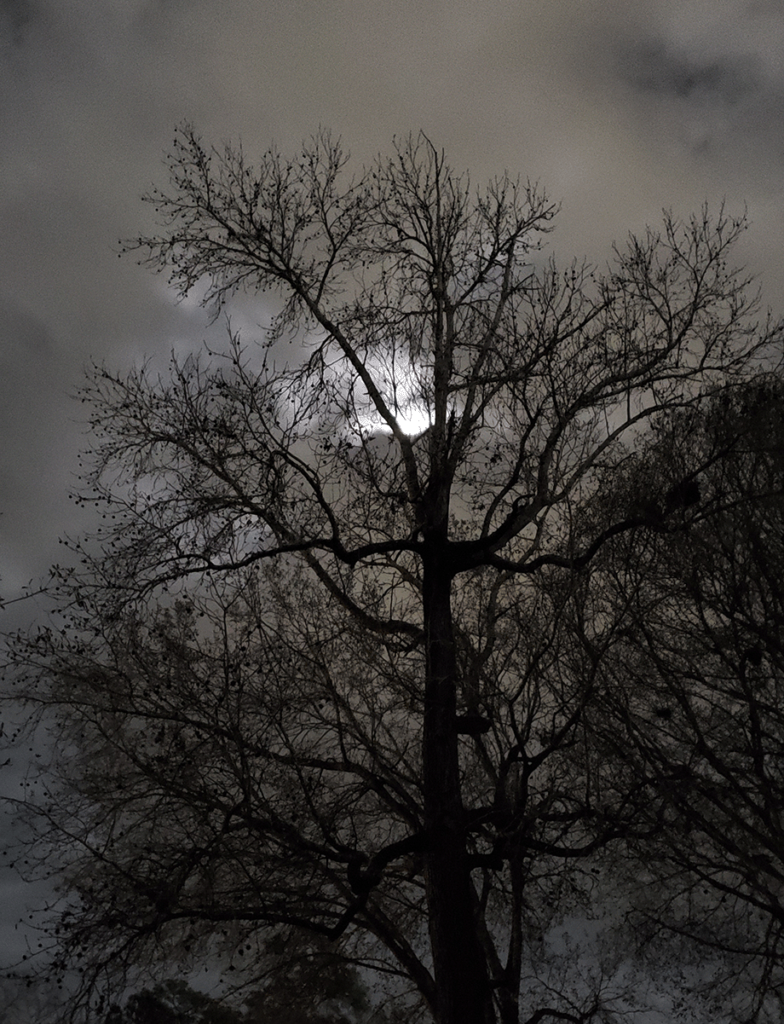Tomorrow is one of the dates celebrated as Hecate’s Night, so this, I suppose, is Hecate’s Night Eve.
My own relationship with the Goddess of the Witches is a complicated one. But then my relationships with most of the gods and spirits is complicated, because relationships are complicated. They form organically, and grow, or die, over time.
As Hecate comes ostensibly to us out of Greek mythology, she was never top of mind for me when I was younger. Of course, I read the stories, knew the names of the gods and heroes, and how they equated to the Roman names that cropped up in astrology, astronomy, and on the various NASA programs. But I was, and remain, deeply involved in the culture of Ancient Egypt.
Hecate nevertheless made herself present in my life some years ago, as muse if nothing else. She inspired a painting I made for, and I believe still belongs to, a young witch of my acquaintance.

Whispered wind in barren trees
The distant baying of hounds
Cold and fear
Staring out of the grave.
We referred to her simply as “The Witch” or the “The Witch Painting”. It was a singular work, one of those portraits where the eyes follow you around the room. The affect was accidental, or at least synchronistic, as by intention and artifice I have not been able to reproduce it. There are no photos in my possession of this painting. This was made in the days of analog, when you had to shoot with film, develop and print same, and there was a cost associated that a young “starving artist” could not support for a mere work of vanity and friendship.
But the image remains more or less in my brain, and I have made a couple of stabs at reproducing it since, though I fully doubt the power imbued in that original will ever occupy a later copy, nor should it, and I am okay with that.
Over the intervening years, however, I have come to know that this painting was a votive or shrine or altar to Hecate. It’s a portrait of her, or at least of the aspect of her she showed me those years ago in the student ‘s studio. It does not have the usual trappings, but there is no doubt in my mind that she is connected with it. and to a lesser extent, the one’s I have made later for my own collection.
Because of that I have dug a little deeper into her background and found that she is not Greek, but probably imported from Anatolia, and like the Titans she is frequently grouped with, represents the beliefs of a much older culture, with closer connections to creative chaos than the Olympian soap opera. I try not to bring these things up. Everyone has family drama, and frankly, her background is none of my business. Think about it. If you were being summoned by some sorceror, would you want to be reminded of all the crap that you had to deal with growing up? I certainly wouldn’t. And it certainly wouldn’t incline me toward granting any potential boons.
We all have a right to our private lives, the gods no less than anyone else.
Some may think my regarding the gods and spirits with such familiarity is out of keeping with their status. Yet I would counter that this is simply the way I have come to know them, and interact with them. I do not find it useful, practical, or realistic to regard them as some distant entity residing in a crumbling ruin in a far away land. I would think the gods have moved on, or rather, that their presence has shifted to other focal points.
Look at it logically. Imagine you are a small business with a few loyal employees providing a valid service for the community. But due to changes of fortune, you start losing customers. People stop dropping in. You can’t really afford to keep your staff on, or even maintain the property.
Would you hang around there moping for an eon or two, or would you go look for greener pastures?
Yes, clearly there are spirits that haunt certain places, and I have no doubt that if you found a temple dedicated to Hecate that you might have a good chance of drawing her attention by performing an ancient secret ritual. Who doesn’t like a bit of nostalgia now and again.
But the gods (and other spirits) as we encounter them, thrive on, or at least enjoy, our interaction. So they are going to go where that interaction is, even if it’s a blasted heath in Medieval Scotland.
Thing is, though the Bard’s story was set in an earlier period, he was doubtless drawing on knowledge (or at least awareness) of the contemporary regard for Hecate as a goddess of witches, commander of lesser shades and spirits, and an excellent necromancer in her own right. While Dr. Dee and other “scholarly mages” were summoning angels to compel the denizens of the graveyard to divulge cosmic secrets and the locations of any nearby buried treasure, the common folk had recourse to witches, and the witches were clearly still worshipping Hecate.
If you are looking for specifics as to the nature of that worship, you’ll have to find it elsewhere. I understand that there’s a feast or supper traditional to the Hecate’s Night commemoration, but I have little details. The Wyrd Sisters cooked up that hell-broth we all know so well, but free-range newts are so hard to find these days, let alone fenny snake filet. They don’t even carry it at Whole Foods.
I am not a petitioner of Hecate. I was given a gift by her many years ago, and that was to paint a version of her portrait to give as a gift to another witch. Like a post hypnotic suggestion, it is only through many intervening years that I have been able to realize that it was Hecate. And it is thus entirely possible that it is only now that I should consider approaching her again.
And this brings up that question of familiarity. As I have reached this awareness of the goddess, I have gone looking for authentic sources on her nature and proper conduct of rituals. Like much of modern magic, and particularly as AI and search-engine based texts are being used to feed the new market, it is virtually impossible to look to any of these sources and be comfortable that they have a true historical or even moderately well researched link to the actual fact of how this goddess was worshipped, or even understood, in antiquity.
This can be extremely frustrating for those, either novice or seasoned practicioner, seeking to expand their awareness and connect with any spirit or god. There are a number of current practices regarding the Egyptian gods that I personally cannot connect with, both because of my awareness of the history of the worship of those gods, and because of my familiarity with those spirits through years of interaction in my own way.
Jason Miller in his Consorting with Spirits and other works suggests that one should most probably approach a spirit or god using the methods that have come down to us from elder times. I don’t disagree with him entirely about that. The reasoning he expresses is that these beings are very different in nature than us, and dwell, or at least exist primarily in some kind of space-time dimension that is separate from ours. These continua operate under a different kind of physics, and thus respond to manipulation in different ways than our own dimensional space. Chanting a spell from Ancient Greece may be an entirely viable method of manipulating the dimensional boundaries between our existence and theirs, and making possible a wee crack in the door.
On the other hand, Miller himself admits to having encountered Hecate in a charnel ground in Asia, while pursuing a study of Buddhism. This argues two points. First, the gods and spirits are not bound by our ordinary space, and may manifest as it pleases them. They don’t necessarily need their temple or an idol to inhabit, or even a ritual to be performed. They exist wherever and whenever they want to.
Secondarily, the spirits can choose to interact with humans the same way humans choose to interact with a spirit. They can, and do, decide to introduce themselves to persons who have made no attempt to propitiate them or even get their attention. And in those situations, the usual rules may be suspended, or at least flexed a bit.
Aside from Zeus notorious philandering, the Greek myths are replete with stories of one or another of the Olympians favoring or aiding mere mortals for their own reasons. The capriciousness of many of these encounters is often given as the impetus for a war or an adventure that widens the myth cycle.
Older gods out of Egypt and Mesopotamia are a bit more aloof. These cultures had a very strict caste system and the gods were at the top of it. While they might deign to aid a king, high-priest, or upper-class born hero, their connection to the peasantry was only a trickle-down. The gods smiled upon Pharaoh, because he was one of their own. Pharaoh smiled upon the people and that was enough.
This didn’t keep the common folk from going and making offerings in the temple, or praying (after a fashion) to the gods for help, but this was through the mechanism of the priesthood; a method later adopted by the Christian theocracy. These were political and economic strategies rather than an intersession from deity.
For now, I am still pursuing knowledge of Hecate, and weighing the sources accordingly. I am not much for predestined outcomes, but my conception of the world of gods and spirits includes the existence of very different timescales, and that “future” and “past” are not necessarily as fixed in these other worlds as they are in ours. The perception I have of the time since I made this portrait and my present interest in learning more about the sitter, may only be moments to her.
In any case, I wish to all, especially the good lady herself, a most respectful and propitious Hecate’s night, and hope she notes the tip-tapping of my keyboard as I write. I’d happily buy her dinner for the peace that painting continues to bring me.
I’ll be back next week.






